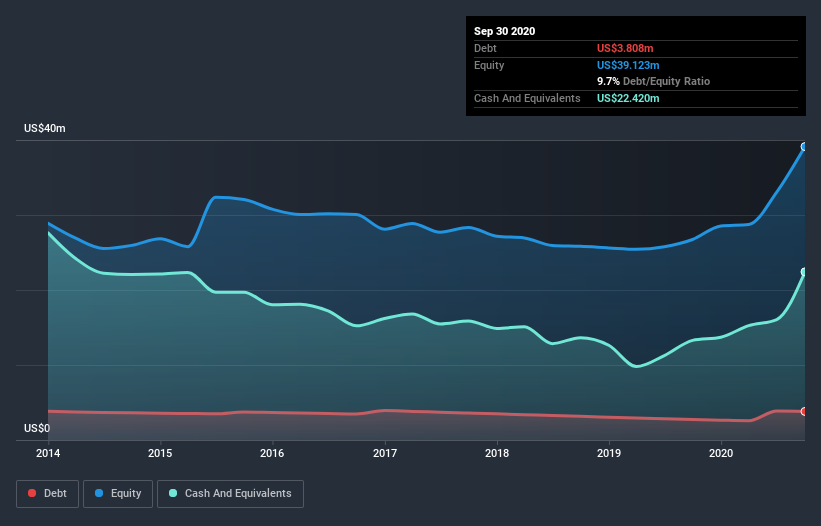These 4 Measures Indicate That Retractable Technologies (NYSEMKT:RVP) Is Using Debt Reasonably Well
David Iben put it well when he said, 'Volatility is not a risk we care about. What we care about is avoiding the permanent loss of capital.' So it might be obvious that you need to consider debt, when you think about how risky any given stock is, because too much debt can sink a company. As with many other companies Retractable Technologies, Inc. (NYSEMKT:RVP) makes use of debt. But the real question is whether this debt is making the company risky.
When Is Debt Dangerous?
Generally speaking, debt only becomes a real problem when a company can't easily pay it off, either by raising capital or with its own cash flow. Ultimately, if the company can't fulfill its legal obligations to repay debt, shareholders could walk away with nothing. However, a more usual (but still expensive) situation is where a company must dilute shareholders at a cheap share price simply to get debt under control. Of course, debt can be an important tool in businesses, particularly capital heavy businesses. When we think about a company's use of debt, we first look at cash and debt together.
Check out our latest analysis for Retractable Technologies
How Much Debt Does Retractable Technologies Carry?
You can click the graphic below for the historical numbers, but it shows that as of September 2020 Retractable Technologies had US$3.79m of debt, an increase on US$2.73m, over one year. However, it does have US$22.4m in cash offsetting this, leading to net cash of US$18.6m.
How Healthy Is Retractable Technologies's Balance Sheet?
Zooming in on the latest balance sheet data, we can see that Retractable Technologies had liabilities of US$14.8m due within 12 months and liabilities of US$13.2m due beyond that. Offsetting this, it had US$22.4m in cash and US$16.0m in receivables that were due within 12 months. So it actually has US$10.3m more liquid assets than total liabilities.
This short term liquidity is a sign that Retractable Technologies could probably pay off its debt with ease, as its balance sheet is far from stretched. Succinctly put, Retractable Technologies boasts net cash, so it's fair to say it does not have a heavy debt load!
Better yet, Retractable Technologies grew its EBIT by 1,785% last year, which is an impressive improvement. If maintained that growth will make the debt even more manageable in the years ahead. There's no doubt that we learn most about debt from the balance sheet. But it is Retractable Technologies's earnings that will influence how the balance sheet holds up in the future. So if you're keen to discover more about its earnings, it might be worth checking out this graph of its long term earnings trend.
Finally, a company can only pay off debt with cold hard cash, not accounting profits. Retractable Technologies may have net cash on the balance sheet, but it is still interesting to look at how well the business converts its earnings before interest and tax (EBIT) to free cash flow, because that will influence both its need for, and its capacity to manage debt. Over the last two years, Retractable Technologies barely recorded positive free cash flow, in total. While many companies do operate at break-even, we prefer see substantial free cash flow, especially if a it already has dead.
Summing up
While it is always sensible to investigate a company's debt, in this case Retractable Technologies has US$18.6m in net cash and a decent-looking balance sheet. And we liked the look of last year's 1,785% year-on-year EBIT growth. So we don't think Retractable Technologies's use of debt is risky. When analysing debt levels, the balance sheet is the obvious place to start. However, not all investment risk resides within the balance sheet - far from it. For example, we've discovered 3 warning signs for Retractable Technologies (1 can't be ignored!) that you should be aware of before investing here.
If, after all that, you're more interested in a fast growing company with a rock-solid balance sheet, then check out our list of net cash growth stocks without delay.
This article by Simply Wall St is general in nature. It does not constitute a recommendation to buy or sell any stock, and does not take account of your objectives, or your financial situation. We aim to bring you long-term focused analysis driven by fundamental data. Note that our analysis may not factor in the latest price-sensitive company announcements or qualitative material. Simply Wall St has no position in any stocks mentioned.
Have feedback on this article? Concerned about the content? Get in touch with us directly. Alternatively, email editorial-team (at) simplywallst.com.

